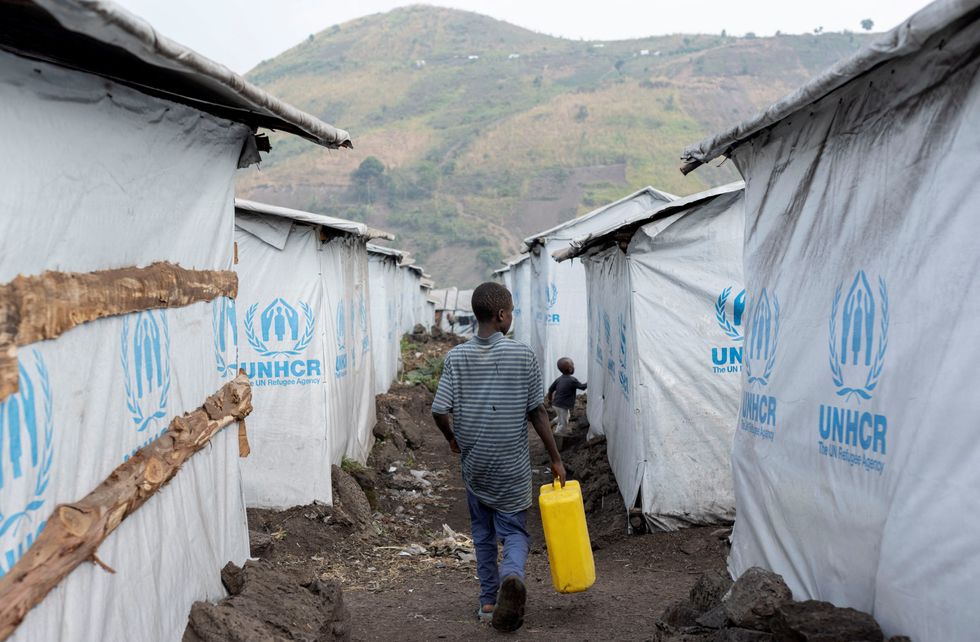The first case of a potentially deadly new strain of the mpox virus known as Clade 1b has been detected in Britain.
The person involved developed flu-like symptoms more than 24 hours later and, on October 24, started to develop a rash, which worsened in the following days.
The person attended an emergency department in London on October 27, where they were swabbed, tested and sent home to isolate while waiting for the results.
They have now been transferred to the Royal Free Hospital high-consequence infectious diseases unit for treatment.

Clade 1b is gripping parts of Central and West Africa. It also spreading beyond the continent
Reuters
Mpox is a viral disease that causes fluid-filled skin lesions, fever and, in severe cases, death. It’s spread through close contact with an infected person’s skin, sores, scabs, bodily fluids, or respiratory droplets.
Fewer than 10 people who are thought to have come into contact with the patient are initially being traced, the UKHSA said.
These are household contacts, although the UKHSA is “still working” on the number of people it may have to contact trace.
Commenting on the confirmation of the first confirmed case of Clade 1b in England, Cllr David Fothergill, Chairman of the Local Government Association’s Community Wellbeing Board said: “Local public health teams are working closely with the UK Health Security Agency. Surveillance, contact tracing, accurate information from trusted sources, vaccines, treatment and support are key to stop the spread.
“As the virus spreads through close contact, we are urging everyone to be aware of any unusual rashes or lesions and to contact NHS 111 or their local sexual health service if they have any concerns.”
The development does not come as a surprise to Professor Jonathan Ball, Deputy Director of Liverpool School of Tropical Medicine and Professor of Molecular Virology, Liverpool School of Tropical Medicine,
He said: “This is not unexpected. There are active human to human transmission chains of Clade 1b monkeypox infections in several countries in sub-Saharan Africa, and therefore people coming into close contact with anyone infected is at risk.
“WHO previously announced the Mpox outbreak a public health emergency of international concern in recognition of its potential for continued and potentially accelerated spread if the global community did not come together in a concerted effort to stamp out the current outbreak. This was more recently backed up by the announcement yesterday of activation of the Global Health Emergency Corps to strengthen the response.
“The number of cases reported outside of Africa remains low, but the ability of Clade 1b virus to spread by human to human transmission means that this issue can not be ignored. It is unlikely that we will see extensive outbreaks in countries with well developed public health and surveillance systems, but it is a reminder that we need to do more to remove health inequalities around the world.”
Clade 1b – is gripping parts of Central and West Africa. It has infected more than 25,000 people, and led to almost 1,000 deaths since it was detected in the Democratic Republic of the Congo last year.
It has also spread beyond the continent.
Thailand confirmed its first case of suspected Clade 1b in August, following Sweden, Thailand, Pakistan and the Philippines.
In response to the current outbreak, the World Health Organization (WHO) and partners, in collaboration with member states, have activated the Global Health Emergency Corps (GHEC) for the first time.
GHEC is a grouping of professionals with the objective of strengthening the response to health emergencies and a collaboration platform for countries and health emergency networks.
It supports countries on their health emergency workforce, the surge deployment of experts and the networking of technical leaders.
The first activation of this new support mechanism follows the declaration of mpox as a public health emergency of international concern by WHO Director-General Doctor Tedros Adhanom Ghebreyesus on 14 August 2024.
“WHO and partners are supporting the government of the Democratic Republic of the Congo and other countries to implement an integrated approach to case detection, contact tracing, targeted vaccination, clinical and home care, infection prevention and control, community engagement and mobilization, and specialized logistical support,” said Dr Mike Ryan, Executive Director of WHO’s Health Emergencies Programme.
“The GHEC enhances the ability of the many effective responders at national and regional levels to collaborate and ensure the success on the ground in interrupting transmission and reducing suffering.”
Emergency measures are needed.
Unlike Clade 2, which was confined to men having sex with men, Clade 1b is spreading more widely through heterosexual contact, pregnant women and children.
LATEST HEALTH DEVELOPMENTS

Sweden confirmed its first case of mpox on August 15, 2024
Getty
It also has a higher death rate than Clade 2, which sparked the 2022 UK outbreak.
Eighteen African countries have reported mpox cases this year, and the rapid spread of clade 1b mpox to at least two other regions has raised concerns about further spread.
Doctor Eoghan De Barra, Consultant in Infectious Diseases at Beaumont Hospital will welcome WHO’s activation of GHEC in response to the outbreak.
He previously told GB News that WHO should focus on research and medical communities, and signal to governments that they should assess their planning and preparedness.
“We have the tools to limit the impact of mpox on human health, but need resources, education and ongoing scientific investigation to optimise them,” Doctor De Barra said.